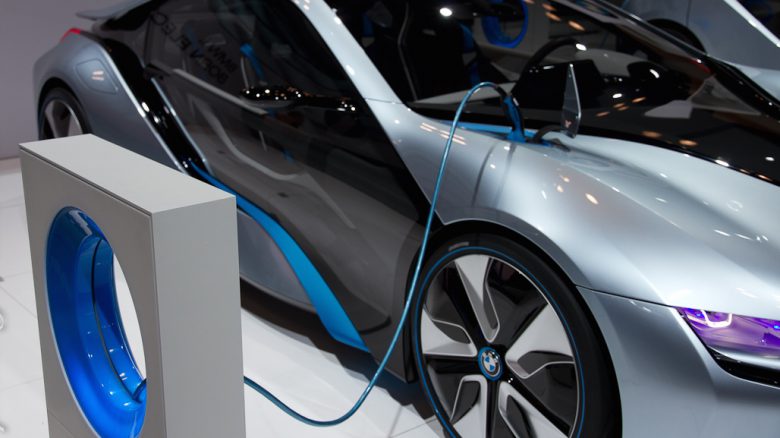
A recent survey commissioned by Adrian Flux has found that just three per cent of motorists are likely to buy an electric car in the next five years.
1,784 customers were asked series of questions about electric cars, driverless cars (as previously reported here) and other motoring hot-topics, and the results showed that a staggering 97 per cent of us are still unconvinced about the benefits of electric cars.
The electric car market has undergone a resurgence in recent years, with the number of electric cars on Britain’s roads shooting up to more than 40,000 from just 3,500 two years ago.
Spurred on by pressure to produce more practical and affordable vehicles, as well as a need to reduce emissions, many manufacturers have upped their game and released a slew of new electric models.
The Nissan Leaf, BMW i3 and i8, VW e-Golf and Tesla Model S have raised the bar and profile of fully electric vehicles, while Ford has promised to launch 13 electric cars by 2020.

The BMW i8
Growth in the electric market has also been driven by government incentives, including grants of up to £5,000 towards the cost of a new car, as well as road-tax and London congestion charge exemptions.
But despite the steady increase in EVs on our roads, only three per cent of our respondents answered that they were ‘very likely’ to purchase one in the next five years, 23 per cent said they were undecided, and the remaining 73 per cent were firmly against the new technology.
These figures represent just a one percentage point rise in interest since a 2012 survey by Adrian Flux that just two per cent of motorists were considering switching to an electric car, with 28 per cent undecided.
Of those asked this time, nearly 19 per cent gave range anxiety, a fear of running out of charge mid-journey, as the main roadblock to their purchase, while 35 per cent said that they simply enjoyed driving traditional petrol and diesel cars too much to ever make the switch.
More than 22 per cent cited the cost of new vehicles (despite the grant) as their main objection, with a further seven per cent raising concerns about the cost of replacing expensive batteries.
One surveyed driver highlighted the dangers of embracing new technology too early, claiming that “the pace of development is such that within a few years, any electric car bought today would be completely worthless,” while another asked whether a lack of industry standards for batteries and chargers could cause headaches for drivers.
Others questioned the environmental benefit of electric cars, with one saying: “I’m concerned about the long-term environmental effects of spent batteries,” with another adding: “I would be most interested if the electricity was produced from renewable sources… fossil-fuel-produced power is no better than using petrol.”

Charging points like this are becoming a common sight across the UK
Gerry Bucke, general manager at Flux, said that the survey revealed that both a love of conventional cars and a reluctance to buy into a technology still in its infancy stood in the way of greater electric car uptake.
“Many of the people who took our survey said that they felt electric cars, or at least hybrids, would one day be commonplace on our roads, but most thought that there were still many hurdles for manufacturers to jump before that happened.
“Even though we have an increased number of charging points in the UK, many motorists still suffer from range anxiety, which is something which won’t disappear until chargers are as widespread as petrol stations, charging is as quick as filling up, and electric cars can offer similar ranges to current vehicles.
“Despite the government grant, new electric cars still tend to cost more than their petrol or diesel-powered cousins, which remains an issue for many, as do the supposed environmental benefits. People remain unconvinced about the practicality of the technology as it stands, as well as whether the cars are as green as manufacturers claim.”
10 more reasons people said no to electric cars:
- I drive a campervan, and even modern ones are battery hungry, so a fully-electric one just wouldn’t be practical
- Years ago I was part of an EV trial and I thought they were brilliant, but now as a pensioner I think the cost of purchase would put me off
- I tow heavy loads with my car and I doubt electric cars will be powerful enough, with big enough batteries, for a very long time
- There is no suitable outdoor electrical charging infrastructure at my home or workplace, and I don’t want to spend money installing it
- I drive a van fitted with a ramp to carry my wife in an electric wheelchair, and can’t see anyone producing a suitable vehicle in the near future
- Global warming is still being debated, so I’m not convinced we need electric cars – better to clean up industry or power stations first
- I currently drive a classic car, and feel that keeping this car on the road is better for the environment than regularly replacing the car with a new machine every few years
- I live in a flat, and the cost of installing a charging point on a shared driveway where I may not even get to park next to it would be prohibitive
- They aren’t green enough – the more EVs on the road, the more energy needs to be produced, so the benefits will just be balanced by power stations
- I drive vehicles on 100% bio-fuel, which is carbon neutral, and think that we should be looking at that more to cut down on power station pollution

You May Also Like …
The best electric car to buy for 2018 – the Adrian Flux top 10